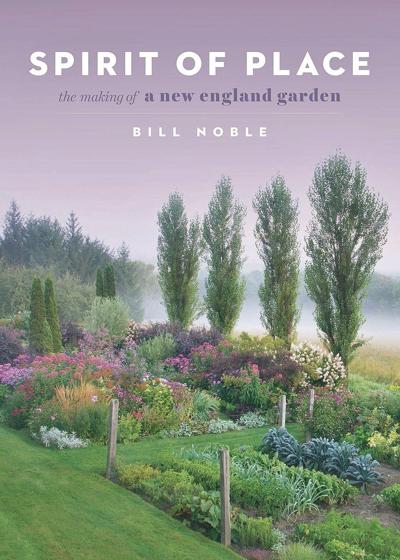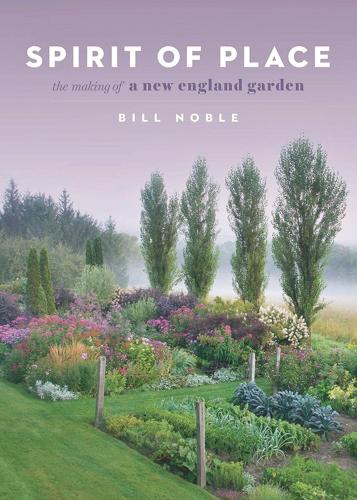As gardening has climbed to the top of the list of popular hobbies in the U.S, both beginners and professionals increasingly turn to the garden books that beckon from the shelves of their local bookstore. The sheer volume of books on specific kinds of plants from asters to zinnias, techniques for soil preparation, and composting, garden history, etc. can often feel overwhelming and send the aspiring gardener fleeing to the Romance section of the store.
So, what is one to do?
Finally, we have the solution in Bill Noble's new book, "Spirit of Place: The Making of a New England Garden" (Timber Press, 2020). Noble has combined all of the key ingredients that the ideal garden book should offer: superb photographs accompanied by concise labels clearly identifying every plant in the photo; specific, practical "how to" details on pages easily distinguished by their colorful backgrounds; historical details on gardening in the Upper Valley of Vermont and New Hampshire; and lyrical prose that explains why someone would spend their life creating a beautiful setting that is inevitably impermanent.
Noble introduces the book with an engaging story of how as a young man brought up in suburban Connecticut and pursuing a graduate degree in medieval studies he gradually evolved into one of today's outstanding gardeners. Learning on the job first as a farmer raising vegetables on a 10-acre plot and selling them at farmers markets in the Upper Valley, Noble eventually worked at a series of historic gardens (prominently Aspet, Augustus Saint-Gaudens' garden in Cornish, N.H. and The Fells, the Hay garden in Newbury, N.H.) where he learned not only the craft of gardening but also the impact of place and its history, its evolution, its specific conditions, and most of all its "spirit."
It is with intention that Noble titled his book "Spirit of Place" since "spirit" has been the guiding principle in his garden design over nearly 30 years on Bragg Hill in Norwich, Vt. As he writes early in the book, "Much of what gardening is about, is the feeling of being connected to a place, fostering a sense of belonging, and becoming familiar with the natural rhythms and cycles of a particular piece of the earth."
Noble's "particular piece of the earth" is a 22-acre plot with hay fields, woods, a brook, a farmhouse and the remnants of several barns and stables on a dirt road several miles out of town. Here, beginning in the 1920s, the McKenzie family farmed and gardened around a century old Greek Revival Cape. Noble and his partner bought the property in 1991 and set about rejuvenating the overgrown gardens and creating new garden spaces among the falling-down outbuildings.
Eschewing the standard garden book practice of taking the reader through the four seasons, Noble guides the reader through each garden space individually, explaining the specific "sense of place that imparts an emotion" and how that emotion or spirit led to the choice of plant combinations and their placement. As he walks us through the gardens from those directly abutting the house (the Flower Garden and its neighboring Vegetable Garden, the Long Border, Rock Garden, Stable) to the more distant areas (the New Meadow, Silver and Gold, and Cove gardens), the emphasis is consistently upon how this "short garden journey rewards with an array of experiences and emotions."
The reader absorbs several lessons along this journey. First is the excitement of learning about new plants, new planting techniques, new combinations, and new settings. Noble emphasizes that the garden is similar to a living organism: changing, growing, dying in parts, and arising new in others.
A second theme is that a gardener is fated to fail and that failure is as good a teacher as success. Noble "planted this garden as if I were composing a landscape painting." The key word here is "composing," and nobody's first attempts, whether at painting or gardening are totally successful. Try it! See if it works and learn from both good and poor outcomes. Adjust, edit, move, try again.
A third theme is that a garden is never complete. As Noble writes, "the urge to experiment with new plants and attempt newer garden styles is ever-present."
My only criticism of the book is that the amount of plant knowledge and information crammed into the 288 pages between the two covers threatens to overwhelm even the most avid gardener/reader. I began to take notes on new plants and plant combinations that I wanted to try in my own Upper Valley garden but abandoned the effort after I had covered two pages with microscopic writing. There simply is no way for the amateur gardener to duplicate Noble's work since he has had access to garden professionals all over the world for unusual and rare specimens and seeds and brings 40-plus years of experience and knowledge to his work.
No need for despair, however. The index is superbly detailed and exhaustive. The "A's" alone comprise 59 different species from Acer pseudosieboldianum to Azalea, and a quick check of several of these items led me to both text and superb photographs.
Most garden books combine text by the author and photographs by a collaborating professional. In "Spirit of Place," Noble is both the writer and the photographer, and the photographs are simply spectacular. Varying from the long view of an entire garden or vista to close-ups of specific flowers that are vividly sharp and color-true, the photographs and their legends alone are worth the price of admission.
In writing about his Himalayan garden, Noble refers to a book he relied on about the flowers of western China, writing "I flipped through this volume for hours," a phrase that well describes my own experience with his book. Whether you know your Aralia from your Aruncus or not, this is a book that will delight you, inform you, and inspire you to get out there and get into the dirt, a particularly wonderful way to practice social distancing in this strange and unsettling time.
Michael F. Epstein is a retired physician who reads and writes in Cambridge, Mass., and Brownsville, Vt. You can contact him and find suggestions for what to read next at his web site, www.EpsteinReads.com where you will find more than 1,000 book reviews.







